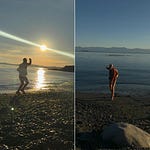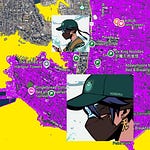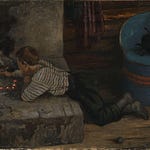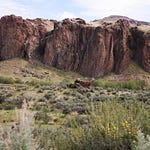Welcome to Walk Around—a new direction for this podcast.
Last summer, 2021, I had an idea while walking in the high country—to make a podcast about walking. I've walked a long way, and to be honest, my creative path as an artist started right there, with walking.
Walking itself is so simple, yet so corrective and health generating. For me walking, running, or any self-powered movement have always helped me find traction on ideas, reckon with problems, or work through difficulty, in ways nothing else can. Maybe it’s that moving my body through space at an understandable rate allows me to untangle what I seek to understand. Movement unties the knots, mental and physical, that life builds up. It clears my eyes, mind, and spirit.
I never got far with the idea, to rename this podcast & newsletter, because it seemed too single-minded. I don’t intend to write “about” walking. I just want to write what I find useful in the moment, along themes of understanding and communing with nature.
Below is a transcript I recorded during a run today. I hope you enjoy listening or reading what I shared, and the new direction I am heading.
Transcript
(the text below is verbatim, so it’s a little awkward read rather than listened to)
There's a beaver pond a couple ridges over from where I live. Recently, I rode my bike past—and yesterday I stopped there on the way back from picking up some flour with Anna for the bread baking that she's getting into. The first time I drove by the pond, I saw a beaver swimming along. And the pond was really smooth and glass like, reflecting the hills and the trees around it.
It's not much of a pond though. It's kind of abandoned looking. The trees aren't very big the brushes scraggly. There's an old dike or something, some kind of an old dam. Someone used to drive their car over it to someone's house, back in a hollow that's now been razed. And the only only thing left is a stone foundation.
In other words, it's just the kind of place I love.
I like places that aren't really noticed by anyone else. And they have a quiet solitude. Anna & I walked over the Beaver Dam and into this old pasture-meadow, that's since grown up with a lot of trees. There were many game trails crisscrossing the area, headed to the apple trees, down to the water, along the creek, through the trees. It was astonishing. Animals seem to go where people don't like to go. And I guess that's why I like some of these places. They have a special gentleness to them.
I like beaver ponds too because while they serve a function that we can all see and understand: by slowing down the flow of water, allowing it to soak into the ground, creating a reservoir underneath the pond, keeping the water cold for fish, allowing cleared areas along the edges of it that the beavers keep cut for food. Allowing amphibians and other small mammals and large animals to flourish because of the abundance of food and space and water. And allowing sediment to be trapped from the rivers to keep them running clear and high. Those are all the physical functions of the beaver pond. But I see it as a refuge. I see them as refuges. Especially now, when everywhere weather is more drastic, temperatures are higher and lower. Even though they're small, they maintain a homeostasis in some way. Just because of the amount of water that's sitting there, which acts as a sink for hot air and a reservoir for cool water.
And energetically I think that kind of a feeling is present in those places. When a person goes to a beaver pond if they're in the right frame of mind, they can feel that it's a refuge. And it's not just a physical refuge. It's a refuge for emotional well-being.
And that's just really the kind of place I like.
I'm going to read a poem I wrote recently when my mom was visiting. It was a beautiful visit. She is such an amazing person, and I love her so much. She's taught me so many things and she's so wise. She's really seen a lot of people. She was a teacher for three decades, moved all over the country—and she just has a lot that she understands about how the world works. Most recently, her final frontier has been true self-care. (laughs) Which is good because she's always been someone who's given herself away to everyone else around her. So, if you're listening, mom, try to find a beaver pond or some refuge to go to today.
And here's the poem I wrote when we were walking along one of the branches of the rivers here in Vermont together. It was on one of the only paths I've been able to find that goes right along a river without a road between the path, or running too close. It's really rare here. Every single valley has a road through it. But maybe there are some mountain streams I haven't found yet. I'm sure that there are, but there aren't trails along them. It's interesting. There needs to be more relationships with rivers here in that way. It is the circulatory network after all.
So here's the poem.
The title is from something my mom said, as we are standing at the end of the trail, after walking it.
To be here
is to begin to understand
The view downstream below a tulip poplar eeks out a turn. In the yellow current the water slides and plays over dark grey rocks. Golden leaves mark the black river bottom as we walk down a flat path. Between trees glimpses of the stream. A leaf falls, and lands Our conversation contains spaces, and turnings Old knees, and new Rise, and fall As we find our way Gently, completely forward.
I paused there—I don't know if you could hear it, but just after I stopped reading, there was a breeze that blew through the trees. And a bunch of leaves fell. I'm surrounded by bright yellow leaves in a maple, beech, birch, and pine forest.
But things like this just seem to happen. It has been completely dead still this morning. No wind at all. Not even a single leaf moving. And then just as I stopped reading this breeze comes up out of nowhere. And it was just right here, right next to me. I mean, what is that?
And I tell you, it happens all the time to me when I read poems or read things are experience things out in nature like this, it just happens. It's just a mystery.
But when I dropped my mom at the airport, she had tears in her eyes because it was so sad, she lives across the country, and I'm probably only gonna ever see her twice a year or something. And she said: be sure to watch the water that goes by because it only goes by once.
And I think that that is something someone with a lot of collected wisdom can say, with conviction. I think it's important to live that way.
I often wonder, especially recently, if I'm living the right way. Because there's so many models around me that show me that there's other ways to live that are more comfortable or easier. And what am I getting for living this way? It's kind of difficult and I refuse to spend most of my time, just to be honest, working for money.
If I worked for money more often or worked harder on a career, I could afford to buy a house or have land or not live in a place that doesn't have a sink or a toilet or insulation really, or more than one room. But since I want time, I am stuck living in a way where I can't afford those things. It's my choice. But sometimes I really doubt that choice.
But when my mom says something like be sure to watch the water as it goes by, because it only goes by once, I realize and remember the life is finite. I don't know how long my present state of mind will last. And so it makes sense to do what my deepest calling feels like, even if it makes me poor.
That's what I really believe.
And for some reason, that means doing things like this.
Thank you for listening.














